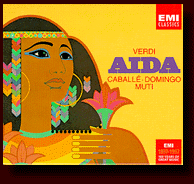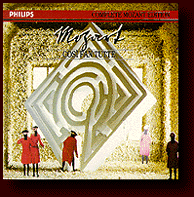Featured Contributors
Luis Angel Catoni / Shawn Chua / Claudia Weber / Tim Evans
SHAWN CHUA (chuahome@singnet.com.sg) from Singapore writes and reviews two Caballe recordings.
![]()
Aida: Sublime perfection on an ethereal plane
 The qualifying
factor that makes this THE Aida recording is the contribution of Montserrat
Caballe in the title role.
The qualifying
factor that makes this THE Aida recording is the contribution of Montserrat
Caballe in the title role.
Note after note and phrase after phrase of unsurpassed and unparalled beauty pour forth from her voice of molten gold as she delivers her reading of the role. From the arias, "Ritorna vincitor" and "O patria mia" to the final duet "O terra addio", Caballe enchants and entrances with her innate musicality and technical prowess.
What puts the icing on the cake for this recording is "O terra addio", where Caballe and Domingo cement the duet that remains unrivalled to date. Indeed, this is singing of the highest order and on the highest plane.
Domingo is every inch the ideal Radames, with his rich and resplendent voice. He is at once both heroic and sensitive. Cossoto's Amneris must be the most realistically vindictive. Her voice strong and supple, she effortlessly navigates the treacherous reaches of the role's tessitura.
Ghiaurov and Cappuccilli lend their voices to the recording with their insight into the roles of Ramfis and Amonasro.
Riccardo Muti, on his debut opera recording, leads the soloists, chorus and orchestra into fusing the individual performances into a whole. He brings new perspective into the Triumphal March that has always been played to tedium.
All in all, this recording is a classic that will never be toppled off the pedestal and is a must-have for all opera libraries.
Cosi Fan Tutte: An assembly of ensembles
 Buy this recording of Cosi for Montserrat
Caballe in her only commercially recorded Mozart role. Cosi being the last
of Mozart's operas in collaboration with da Ponte, it has some of the most
heaven-sent music set to a witty libretto, however the theme of infidelity
did not go down well in its history to date. But here, we have a performance
of such intensity and profundity, played and sung to perfection, it is hard
to resist temptation.
Buy this recording of Cosi for Montserrat
Caballe in her only commercially recorded Mozart role. Cosi being the last
of Mozart's operas in collaboration with da Ponte, it has some of the most
heaven-sent music set to a witty libretto, however the theme of infidelity
did not go down well in its history to date. But here, we have a performance
of such intensity and profundity, played and sung to perfection, it is hard
to resist temptation.
Caballe's reading of Fiordiligi shows us the ideal when a singer is perfectly in sync with the character and is suited to a role. Her singing harks back to an era gone by, of musical intellect, of profound understanding, of innate musicality and unparalled technical prowess.
Her gloriously sung Fiordiligi is aided and abetted by her beautiful voice, pouring forth note after note and phrase after phrase of sublime molten gold. In the test aria, "Come scoglio", she works around the technicalities and hurdles of the piece and delivers an effortlessly accomplished and beautiful rendition. "Per pieta" shows her to further advantage where she excels in her long-breathed phrasing of the music with her trademark piano singing.
Paired with Dame Janet Baker as Dorabella, this performance gains yet another asset. Her foundation in Mozart is as good as it gets. Her intense portrait of Dorabella (is) comparable to Caballe's more buoyant Fiordiligi. She sings with that dark-toned voice of great beauty and intensity that results in one of the best pairings of the sisters on record.
The lovers, Ferrando and Guglielmo, are taken by Nicolai Gedda and Wladimiro Ganzarollo. Gedda gives a refined reading of "Un aura amorosa" and wins us over with his Ferrando. On the other hand, the smug Guglielmo is sung by Ganzarolli who sings with aplomb and gusto.
As an ensemble opera, all the six characters and important and bear the success of the opera on their shoulders. Ileana Cotrubas as Despina gives an impassioned performance and her impersonations of the doctor and the notary are given delightful voices. As the cynical Don Alfonso, Richard Van Allan gives the old philosopher a character well-fleshed out.
This recording is one of the most beautifully sung and well recorded. The ensembles show all the principals singing with understanding of the roles. The Royal Opera House Orchestra and Chorus under the baton on Sir Colin Davis with the accompaniment of John Constable completes the picture. A picture of a recording that is a worthy addition to any opera library.
Mozart would have loved this!